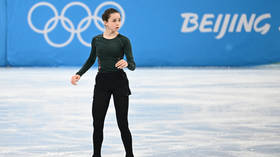Russian figure skater tested positive for ‘prohibited substance’ – testing authority

The future at the Olympics for Kamila Valieva, who played a pivotal role in the Russian Olympic Committee (ROC) team winning gold in the team event, remains unclear after the International Testing Agency (ITA) revealed on Friday that the skater tested positive for a banned heart drug in December.
The ITA reported that Valieva’s sample taken on December 25 during the Russian Figure Skating Championships in St. Petersburg “returned an Adverse Analytical Finding (AAF) for the non-specified prohibited substance trimetazidine.”
The sample was tested in a WADA-accredited lab in Stockholm, which reported the positive result on February 8, a day after the team event concluded, the ITA said. Since the December sample was collected under the authority of Russian Anti-Doping Agency (RUSADA), it was up to the Russian doping watchdog to take further action – which it did, suspending Valieva provisionally “with immediate effect,” according to the ITA.
However, on the following day, February 9, Valieva successfully appealed the suspension before the RUSADA Disciplinary Anti-Doping Committee, leading to her ban on training and competing being lifted by the end of the same day.
While Valieva was cleared to compete in the upcoming single event by RUSADA, the ITA said the International Olympic Committee (IOC) decided to appeal the move to lift the suspension to the Court of Arbitration for Sport (CAS).
The IOC will exercise its right to appeal and not to wait for the reasoned decision by RUSADA, because a decision is needed before the next competition the athlete is due to take part in.
The appeal, which is set to be heard before February 15 – the day of the women’s short skate in the single event which Valieva is a heavy favorite to win – will be led by the ITA on behalf of the IOC.
The Russian Olympic Committee’s team gold also hangs in the balance. The ITA said the decision on whether the victory stands “can be taken by the ISU [The International Skating Union] only after a final decision on the full merits of the case has been taken.”
“The procedure, which is initiated currently, can only address the provisional suspension,” it added.
In a comment to RT, Yaroslav Ashikhmin, who is a member of the European Society of Cardiology and the American Heart Association, described trimetazidine as an old, very weak drug.
“Why it’s being considered as doping is not clear to me. I personally use it extremely rarely, even in treatment, since its effect is not strong enough, it just slightly affects the heart function. You can say that it is a heart vitamin. Of course, it is a complete mess with doping control if this drug is identified as doping,” Ashikhmin said.












